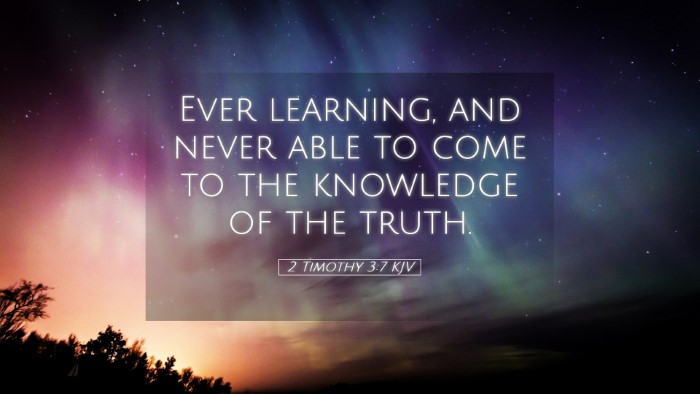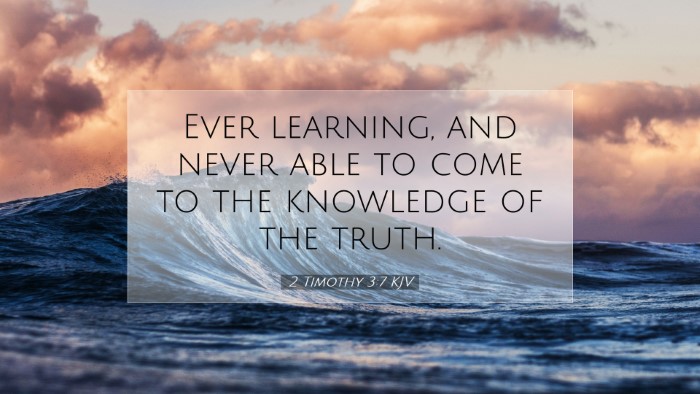Old Testament
Genesis Exodus Leviticus Numbers Deuteronomy Joshua Judges Ruth 1 Samuel 2 Samuel 1 Kings 2 Kings 1 Chronicles 2 Chronicles Ezra Nehemiah Esther Job Psalms Proverbs Ecclesiastes Song of Solomon Isaiah Jeremiah Lamentations Ezekiel Daniel Hosea Joel Amos Obadiah Jonah Micah Nahum Habakkuk Zephaniah Haggai Zechariah Malachi2 Timothy 3:7
2 Timothy 3:7 KJV
Ever learning, and never able to come to the knowledge of the truth.
2 Timothy 3:7 Bible Commentary
Commentary on 2 Timothy 3:7
Verse Text: "Ever learning, and never able to come to the knowledge of the truth."
Introduction
This verse encapsulates a critical caution against the dangers of knowledge that lacks genuine understanding. In the context of Paul’s epistle to Timothy, it serves as a warning about certain individuals who, despite their pursuit of learning, ultimately fail to grasp the truth of the Gospel. Highlighted by notable biblical commentators, this verse invites deep reflection on the nature of true wisdom and understanding.
Contextual Analysis
Paul's second letter to Timothy addresses the perils of false teachings and the moral decline in the society of his time. The phrase "ever learning" indicates an unceasing quest for knowledge, which in itself is not inherently negative. However, Paul contrasts this pursuit with the inability to come to the truth, suggesting a profound disconnect between knowledge and understanding.
Albert Barnes’ Insight
According to Albert Barnes, “ever learning” describes individuals who are continually engaged in acquiring knowledge but remain untransformed by it. They engage in an academic pursuit that does not lead to experiential knowledge or practical application of truth. Barnes points out that such people may be experts in various subjects yet lack wisdom in spiritual matters.
Matthew Henry’s Perspective
Matthew Henry elaborates on the "never able to come to the knowledge of the truth," stressing that genuine knowledge involves an understanding of God and His Word. Henry notes that these individuals are indicative of a prevalent issue in society: intellectual vanity without spiritual fruitfulness. He warns that this could lead to a form of spirituality that is intellectually satisfying yet ultimately devoid of life-changing power.
Adam Clarke’s Commentary
Adam Clarke emphasizes the futility of continuous learning without the application of that knowledge. He mentions that many may read and study the Scriptures but miss the central truths concerning salvation and righteousness. Clarke stresses the necessity of both intellectual and spiritual enlightenment and cautions against the pride that often accompanies mere academic pursuit.
Theological Implications
This verse serves as a powerful reminder for pastors and theologians regarding the balance between knowledge and application. It poses several theological questions:
- What does it mean to truly "know" the truth as it pertains to Christian doctrine?
- How can one discern between mere academic learning and transformative knowledge?
- In what ways are the church and its leaders responsible for guiding believers toward genuine understanding?
Knowledge Versus Wisdom
The connection between knowledge and wisdom is paramount. Knowledge can be acquired through study, while wisdom is the application of that knowledge in a way that aligns with God's will. Proverbs 4:7 emphasizes that wisdom is the principal thing, which invites further reflection on the quality of our learning.
Practical Applications for Ministry
For pastors and church leaders, the challenge presented in 2 Timothy 3:7 lies in fostering a congregation that values both knowledge and wisdom. Here are key applications:
- Encouraging Depth: Facilitate deep biblical studies that go beyond surface-level understanding to reach transformative truths.
- Promoting Living Truth: Teach congregants how to apply biblical truths in everyday decisions and life scenarios.
- Guarding Against Intellectual Pride: Foster humility and a servant attitude in the pursuit of knowledge, as seen in Philippians 2:5-8.
- Creating a Discipleship Culture: Establish programs that emphasize not only learning but also practicing the faith, akin to the Great Commission.
Concluding Thoughts
As we reflect on 2 Timothy 3:7, the persistent quest for knowledge must be rooted in an earnest desire to comprehend and live out the truth found in Christ. Paul’s exhortation serves as an enduring reminder that the ultimate goal of our learning should be a deeper relationship with God and a more profound impact on the world around us.


